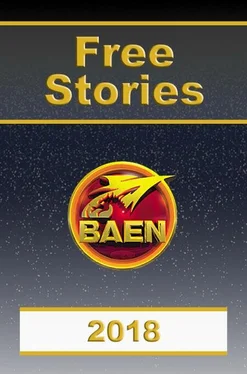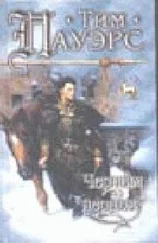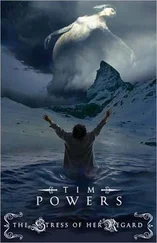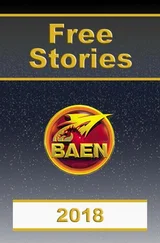But, he chose not to believe that. His own faith was strong, just as when he had destroyed the vision of Satan. Had not Daniel walked out of the furnace alive?
The female voice, the presence of the land of the yellow stone, throbbed up to enfold him, protect him. He closed his eyes and gritted his teeth. If his faith was too weak, he did not deserve to live anyway.
Father Avenir fell forward into the hot pool. The shock flashed around him. The water embraced his skin and his hair. He gasped, but fought back his terror. The wooden cross floated around him as he drifted in the hot pool, like a lifeline.
The water burned and tingled, enfolded him, scrubbed his skin, soaked his hair—but he lived. He drifted there, wrapped in the blanket of his own faith, and of the strength that this land’s magic added to his beliefs. Yes, he was strong enough to do this, and now he would be baptized in the ways of the wild as well as the ways of the white man. His terror lasted only a moment, and then he was cleansed. He was accepted.
After a long moment, the female voice in his mind spoke, “It is as I thought. I know you now, Tatanka, bull of heaven, rock of all Saints, father of the future. You may go, and you will be remembered.”
Father Avenir staggered out of the scalding water and stood with steam drifting from his reddened skin. He looked utterly clean as the water evaporated, his skin pink as a newborn’s, his hair fine and soft. He looked back at the rainbow colors beneath the pool.
He felt he had answers to the strongest mysteries in his heart, while other questions remained—just as powerful, but not quite so urgent. “Thank you,” he muttered, realizing that whatever that spirit was, she also understood the love of God, as he did.
With painstaking care, Father Avenir dressed himself again. Even his stiff and dirty clothes could not take away the new feeling of purity inside him.
With his pack and his furs, the priest trudged away from the valley of the steaming geysers. He needed several days just to think about what he had experienced, to accept it, and to assess the new understanding—the new powers?—that he had acquired. The epiphany made him different. He was not just a priest from the white man’s world, but he was also fundamentally a part of these arcane territories. He was now, as he’d been at birth, both Native and European, both wild and civilized. But for the first time, he accepted both. He was Pierre de Toussaint D’Avenir and he was Tatanka. He wanted to tell the shaman Dosabite everything that had happened. Perhaps Dosabite could only perceive part of it, but even that would help.
Father Avenir made his way through the mountains, camping each night, finding food for his supper or going hungry when he found none. One day in the long shadows of late afternoon, two riders came upon him in the forest. He recognized the long-haired warriors instantly as Cameahwait and his companion. The warrior chief looked strained and saddened, not at all the cocky raider who had first met him some weeks before.
“You are the Catholic priest,” Cameahwait said. “We have searched for you.”
“Yes, you know me. I am Father Avenir.” He paused, and then added, “I am Tatanka Pierre de Toussaint D’Avenir.”
The warrior nodded. “Sacagawea sent me to find you. Her husband has been struck down by the great wizard. His spirit is gone, and she has requested a priest for the last rites.”
Father Avenir brushed off the front of his furs. “I will accompany you. That is my duty as a priest. But, who is Sacagawea?”
“She is my sister,” said Cameahwait, “taken from us as a child by raiders. She is back now, though. She travels on an expedition with a group of white men, led by Captain Lewis and Captain Clark.”
“An expedition?” Avenir asked.
The second warrior was impatient. “There is no time for questions. Come with us. Make haste.”
Father Avenir agreed and mounted up behind the second warrior. “Take me to them, and I will do my duty as a priest.” He understood more, but he also had many questions. Maybe his own revelations could be shared not just with the Native tribes, but with others back in the east. “I look forward to speaking with these Captains Lewis, and Clark.”
Susan R. Matthews
Ghost Flotilla U-boats: Embarkation
Goond—for “Gunther,” Oberleutnant zur See Gunther Hols, First Officer on board the “Smoking Salmon”—leaned up against the railing of the gun platform aft of U-818’s bridge, enjoying the warm breeze in his face and smoking a rare cigarette. It was a beautiful day.
The watch on the bridge had their jackets open to air out whatever they wore next to their skins. Two men of the crew were re-painting the boat’s maeling on the sides of the conning tower, the Smoking Salmon itself, shown curved into a relaxed arc—as if sitting in an arm-chair—and smoking a pipe whose rising smoke was meant to indicate the plume of oily black plume a tanker sent up as it sank.
They’d sunk one off the Cape this cruise, but otherwise the pickings had been slim. They’d missed the latest Allied convoy from Freetown but Headquarters wanted them in place for the next one, so here they were, idling along, burning fuel if not at a very great rate and catching up on boat maintenance. They could afford it. U-818 was an IX-C/40, one of the longer-range boats, and they’d successfully refueled from U-459 south of St. Helena, and taken on torpedoes.
“Sail?” one of the watch said, suddenly, binoculars fixed on a point on the far horizon to the east—Africa. He didn’t sound at all certain. “Masthead, no steam, ZweiVo.”
It wasn’t Goond’s watch, but he was here. As Sclarvie—the second officer, “ZweiVo”—lifted his binoculars to search, Goond raised those without which an officer never climbed onto the bridge to see for himself. It took him a moment to bring the ship into focus: yes, sails. There were sailing vessels a-plenty in the coastal waters, though such things weren’t likely to be good wartime targets. Still—
“We’ll have a look,” Sclarvie said. “I’ll tell the captain. EinsVo?”
Their commander would be “Lieutenant,” in the British Navy. But on board a boat, any boat, there was only one captain, and theirs was Herr Kaleun Verricht Lachs—the “salmon” of their cheeky boat-icon. And Goond was “EinsVo, first officer.” Goond leaned over the open hatch of the conning tower to yell down into the control room.
“Ship,” Goond called. “Under sail, unidentified, bearing two sixty-five. We dive?” A dark-hulled U-boat riding just above the surface of the waves would be much more difficult to spot from a sailing ship than vice versa, and of course a U-boat could get away much faster. But there was a line between confidence and recklessness, and while Lachs had pushed the line on occasion he generally avoided irrational risks. It had taken more than solely good luck to make U-818 a “lucky” boat.
“Periscope depth.” That was their engineering officer—“Ellie,” for Leitender Ingenieur Vilsohn, who had been with U-818 since its construction training. “Close hatches.” No, not an emergency dive, and they wouldn’t go deep. But Goond and the watch cleared the bridge in expeditious haste anyway, in order to not get into a habit of dawdling. Goond was next-to-last man down, with Sclarvie securing the hatch behind him.
It took a moment for Goond’s eyes to adjust to the relative dimness of the boat’s interior. Lachs was there in the Zentral control room, navigation periscope coming up as the boat gently settled beneath the surface of the water to minimize their profile. “I can’t make it out,” Lachs said, frowning a little in his concentration. “Closer, Vilsohn. It’s probably nothing for us.”
Читать дальше







![Тим Пауэрс - Последние дни. Том 2 [litres]](/books/393813/tim-pauers-poslednie-dni-tom-2-litres-thumb.webp)
![Тим Пауэрс - Последние дни. Том 1 [litres]](/books/394090/tim-pauers-poslednie-dni-tom-1-litres-thumb.webp)
![Тим Пауэрс - Последний выдох [litres]](/books/402145/tim-pauers-poslednij-vydoh-litres-thumb.webp)
